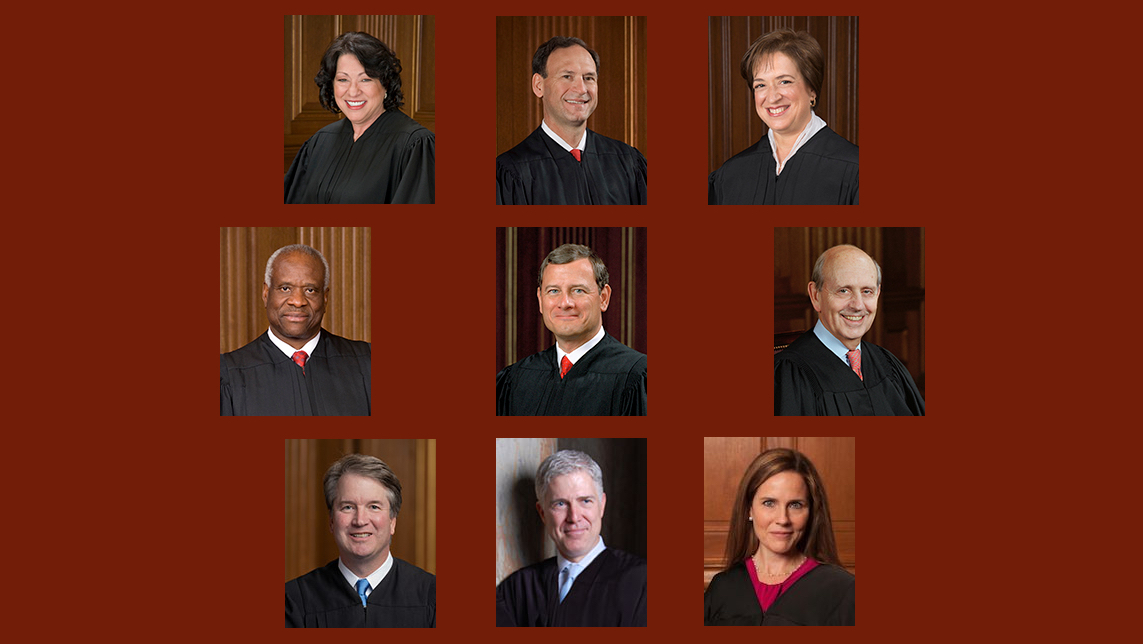How The Right Can Work With The Left On Curtailing The Supreme Court’s Power
Proposals include term limits, requiring a supermajority for some decisions, and randomly drawing justices in a ‘lottery’ from the pool of federal judges.
By Curt Levey – AUGUST 18, 2021
When President Biden extended the eviction moratorium earlier this month, he was openly flouting the Supreme Court, which made it clear in June that new legislation would be necessary for an extension.
Such blatant defiance of the high court is so rare that constitutional scholars look back to Presidents Franklin Roosevelt, Abraham Lincoln, and Thomas Jefferson for examples. That leftists cheered this slap at court authority evinces something deeper than rank politics.
Since at least the Warren Court, conservatives have usually been the ones talking about standing up to the Supreme Court, accusing it of amassing too much power. Leftists, on the other hand, celebrated the court’s power to rewrite the Constitution in service of abortion, LGBT activism, and the like.
That dichotomy has blurred. When I testified recently before President Biden’s commission on Supreme Court reform, I was struck by how many of the leftist witnesses sounded like conservatives as they decried the court’s overreaching power and discussed ways to constrain it. Suggestions of court-packing aside, this shared perception presents an opportunity for conservatives.
Common Ground?
In his testimony, Yale Law School professor Samuel Moyn denounced the current state of Supreme Court jurisprudence, in which we give the court “the last word over large parts of our national political conversation” and “pretend that doing so is either mandated by our Constitution or essential to democracy.” Conservatives upset with the court’s abortion and same-sex marriage rulings couldn’t say it any better.
It was startling to hear Harvard Law School professor Nikolas Bowie support “proposals to disempower the federal courts,” while citing the need to “eliminate hierarchies of race, wealth, and status.” Similarly, Moyn supported “reforms that seek to curtail and manage the [court’s] power.”
Leftists have even adopted the common conservative complaint that the Supreme Court represents elite values. Bowie testified that it is “absurd … to be perpetually governed by five Harvard and Yale alumni,” critiquing the implication that “there is something about the justices that make their interpretive or ethical judgment superior to that of everyone else.” That sounds remarkably like the late Justice Antonin Scalia’s observation that “nine people picked at random from the Kansas City telephone directory” are no less moral authorities than the justices of the Supreme Court.
Sure, leftists’ concerns about Supreme Court overreach are largely a reaction to a more conservative court. But that nonetheless requires a welcome recognition that a Supreme Court unrestrained enough to invent the new constitutional “rights” they crave is also powerful enough to overturn the dogma they cherish. It opens a door to bipartisan reform that conservatives should consider.
An Opportunity for Reform
While leading in the polls for the 2012 GOP presidential nomination, Newt Gingrich proposed ideas for reining in the federal courts. Reaction on the right was mixed and liberals were aghast.
Today, only Republicans remain cool to reform — understandable in the face of loud calls to pack the Supreme Court with additional, Biden-appointed justices. They are also skeptical of Biden’s commission, noting the leftist credentials of most of its members and suspecting its real purpose is to question the current court’s legitimacy or appease the “pack the court” crowd.
To be fair, only a minority of the commission’s mostly left-wing witnesses supported court-packing, which is nakedly partisan and unprincipled. They mostly discussed more thoughtful structural reforms, ones that could eventually garner the bipartisan support needed for enactment, whether legislatively or by constitutional amendment.
I share my fellow conservatives’ concerns about the commission and reform generally. But there’s an important question we need to confront. After many decades of rightfully complaining about Supreme Court overreach, can conservatives afford to categorically reject reforms that would constrain the court’s power? Moreover, the new normal that makes it increasingly improbable to confirm a justice under a divided government may well force reform.
For any reform to get bipartisan support, it must be seen as favoring neither party nor wing of the court. At the very least, the change should take effect after an intervening presidential election. It should also offer the potential for taking some of the political edge off the court and the Senate confirmation process.
Court-Packing Ain’t It, But These Reforms Could Be
Democrats’ court-packing bill, the Judiciary Act of 2021, fails on all those counts. Other prominent proposals, however, include 18-year term limits on the justices, requiring a supermajority of justices for certain kinds of decisions, and a “lottery” in which justices would be randomly drawn from the pool of all federal circuit court judges to serve on the court for a short time, say one session of oral arguments.
Term limits received the most support from the commission’s conservative witnesses, perhaps because they are viewed as a more modest reform. On the flipside, philosopher kings who reign for nearly two decades may be no less overreaching.
A lottery or supermajority requirement would be more likely to change the high court’s internal dynamics. Justices could be incentivized to issue rulings that are both sufficiently narrow and well-grounded in existing law, in order to gain supermajority support or discourage a subsequent random set of justices from overturning them.
That said, the practical effects of any structural reform are speculative. And that’s not the only reason to be cautious. As Justice Stephen Breyer warned, “Structural alteration motivated by the perception of political influence can only feed that perception, further eroding … trust.” Even the best reform will set a precedent for tinkering with the court.
But caution does not require dismissing structural reform out of hand. Instead, conservatives should engage in the ongoing debate about curtailing the court’s power and suggest nonpartisan reforms they could support.
Mr. Levey is a constitutional law attorney and president of the Committee for Justice.

